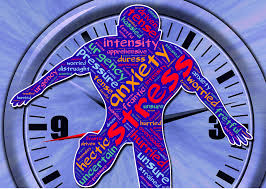April is Stress Awareness Month – a great time to review what the National Institute of Mental Health has to say about the subject and consider how stress impacts your life. This week’s blog contains the NIMH’s five things to know about stress and what you can do to manage it. I’ve also added some tips of my own.
Everyone feels stressed from time to time. But what is stress? How does stress affect your physical and mental health? And what can you do to manage it?
Stress is how the brain and body respond to any demand. Every type of demand or stressor—such as exercise, work, school, major life changes, or traumatic events—can be stressful.
Stress can affect your health. It’s important to pay attention to how you deal with minor and major stress events so that you know when it’s time to seek help.
The National Institute of Mental Health shares five things you should know about stress:
1. Stress affects everyone.
Some people may cope with stress more effectively or recover from stressful events more quickly than others. There are different types of stress—all of which carry physical and mental health risks. A stressor may be a one-time or short-term occurrence, or it can be an occurrence that keeps happening over a long period of time.
Examples of stress include:
 Routine stress related to the pressures of work, school, family and other daily responsibilities
Routine stress related to the pressures of work, school, family and other daily responsibilities- Stress brought about by a sudden negative change, such as losing a job, divorce, or illness
- Traumatic stress experienced in an event like a major accident, war, assault, or a natural disaster where people may be in danger of being seriously hurt or killed. People who experience traumatic stress often experience temporary symptoms of mental illness, but most recover naturally soon after. Some will suffer over time from PTSD (post-traumatic stress disorder).
2. Not all stress is bad.
Stress can motivate people to prepare or perform, like when they need to take a test or interview for a new job. Stress can even be life-saving in some situations. In response to danger, your body prepares to face a threat or flee to safety. In these situations, your pulse quickens, you breathe faster, your muscles tense, your brain uses more oxygen and increases activity—all functions aimed at survival.
3. Long-term stress can harm your health.
 Health problems can occur if the stress response goes on for too long or becomes chronic, such as when the source of stress is constant, or if the response continues after the danger has subsided. With chronic stress, those same life-saving responses in your body can suppress immune, digestive, sleep, and reproductive systems, which may cause them to stop working normally.
Health problems can occur if the stress response goes on for too long or becomes chronic, such as when the source of stress is constant, or if the response continues after the danger has subsided. With chronic stress, those same life-saving responses in your body can suppress immune, digestive, sleep, and reproductive systems, which may cause them to stop working normally.
Different people may feel stress in different ways. For example, some people experience mainly digestive symptoms, while others may have headaches, sleeplessness, sadness, anger or irritability. People under chronic stress are prone to more frequent and severe viral infections, such as the flu or common cold.
Routine stress may be the hardest type of stress to notice at first. Because the source of stress tends to be more constant than in cases of acute or traumatic stress, the body gets no clear signal to return to normal functioning. Over time, continued strain on your body from routine stress may contribute to serious health problems, such as heart disease, high blood pressure, diabetes, and other illnesses, as well as mental disorders like depression or anxiety.
4. There are effective ways to manage stress.
The effects of stress tend to build up over time. Taking practical steps to manage your stress can reduce or prevent these effects. The following are some tips that may help you to cope with stress:
 Recognize the signs of your body’s response to stress, such as difficulty sleeping, increased alcohol and other substance use, being easily angered, feeling depressed, and having low energy.
Recognize the signs of your body’s response to stress, such as difficulty sleeping, increased alcohol and other substance use, being easily angered, feeling depressed, and having low energy.
Talk to your health care provider. Get proper health care for existing or new health problems.
Get regular exercise. Just 30 minutes per day of walking can help boost your mood and reduce stress.
 Try a relaxing activity. Explore stress coping programs, which may incorporate meditation, yoga, tai chi, or other gentle exercises. For some stress-related conditions, these approaches are used in addition to other forms of treatment. Schedule regular times for these and other healthy and relaxing activities. Learn more about these techniques on the National Center for Complementary and Integrative Health (NCCIH) website.
Try a relaxing activity. Explore stress coping programs, which may incorporate meditation, yoga, tai chi, or other gentle exercises. For some stress-related conditions, these approaches are used in addition to other forms of treatment. Schedule regular times for these and other healthy and relaxing activities. Learn more about these techniques on the National Center for Complementary and Integrative Health (NCCIH) website.
 Set goals and priorities. Decide what must get done and what can wait, and learn to say no to new tasks if they are putting you into overload. Celebrate what you have accomplished at the end of the day, rather than chastising yourself for what you were not able to do. If you need additional help with this, register for my free webinar, Managing Priorities. You’ll also find helpful tips in my free eBook, 7 Strategies to Overcome Overwhelm.
Set goals and priorities. Decide what must get done and what can wait, and learn to say no to new tasks if they are putting you into overload. Celebrate what you have accomplished at the end of the day, rather than chastising yourself for what you were not able to do. If you need additional help with this, register for my free webinar, Managing Priorities. You’ll also find helpful tips in my free eBook, 7 Strategies to Overcome Overwhelm.
 Stay connected with people who can provide emotional and other support. To reduce stress, ask for help from friends, family, and community or religious organizations.
Stay connected with people who can provide emotional and other support. To reduce stress, ask for help from friends, family, and community or religious organizations.
Reverse the downward spiral in your mood. My blogs, Make a Positive Mental Shift and Manage Your Emotions, provide some helpful tips.
Release the pressure. If you feel overwhelmed by the things in your environment, on your schedule, or overwhelming your mind, check out these blogs for helpful tips: Declutter Your Life, Managing the Sticky Notes of Life, 7 Signs of Burnout and What to Do About It.
Create “margin” in your life. Dr. Richard Swenson, author of Margin: Restoring Emotional, Physical, Financial, and Time Reserves to Overloaded Lives, defines margin in this way:  “Margin is the space that exists between ourselves and our limits. It is the amount allowed beyond that which is needed. It is something held in reserve for contingencies or unanticipated situations. Margin is the gap between rest and exhaustion, the space between breathing freely and suffocating.” To learn more about how to create margin, read my blog: White Space: Why it matters in your life.
“Margin is the space that exists between ourselves and our limits. It is the amount allowed beyond that which is needed. It is something held in reserve for contingencies or unanticipated situations. Margin is the gap between rest and exhaustion, the space between breathing freely and suffocating.” To learn more about how to create margin, read my blog: White Space: Why it matters in your life.
5. If you’re overwhelmed by stress, ask for help from a health professional.
 You should seek help right away if you have suicidal thoughts, are overwhelmed, feel you cannot cope, or are using drugs or alcohol to cope. Your doctor may be able to provide a recommendation. You can find resources to help you find a mental health provider by visiting the NIMH website.
You should seek help right away if you have suicidal thoughts, are overwhelmed, feel you cannot cope, or are using drugs or alcohol to cope. Your doctor may be able to provide a recommendation. You can find resources to help you find a mental health provider by visiting the NIMH website.
Anyone experiencing severe or long-term, unrelenting stress can become overwhelmed. If you or a loved one is having thoughts of suicide, call the toll-free National Suicide Prevention Lifeline at 1-800-273-TALK (8255), available 24 hours a day, 7 days a week. The service is available to anyone, and all calls are confidential.
For more in-depth assistance with reducing stress in your life, check out my guide, Banish Stress from Your Life: Your Guide to Living More Peacefully.
If you’d like to explore getting some support and learning strategies that will help you manage stress in your life, let’s schedule a no-cost, no-pressure Discovery Call today.
Additional Resources:
- Blog: Make a Positive Mental Shift
- Blog: Declutter Your Life
- Blog: Managing the Sticky Notes of Life
- Blog: Manage Your Emotions
- Blog: White Space: Why it matters in your life
- Blog: 7 Signs of Burnout
- Free eBook: 7 Strategies to Overcome Overwhelm
- Guide: Banish Stress from Your Life: Your Guide to Living More Peacefully
- Guide: Dealing with Procrastination
- Webinar: Managing Priorities
- Webinar: Buried in Paper

Life Architect – Creating Blueprints for Purposeful & Productive Lives
Kathy@OrgCoach.net www.OrgCoach.net Follow me on Facebook





